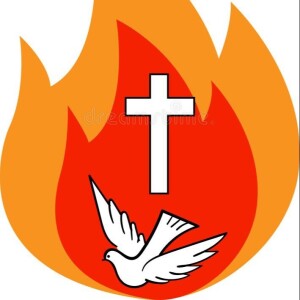Episodes

Thursday Jun 05, 2025
Preparing for Worship - June 8, 2025
Thursday Jun 05, 2025
Thursday Jun 05, 2025
This Sunday is Pentecost Sunday, as we think of the work and importance of God the Holy Spirit. The Old Testament lesson, Genesis 11:1-9, is the opposite of the Pentecost story and reminds us of how vitally important the coming of our Lord Jesus and of the Holy Spirit were. After the fall into sin, and even after the Great Flood, people were all wrapped up in themselves and their own sinful desires, instead of the Lord and His will. They still had a common language and were united and could be inventive, but for their own sinful purposes. They discovered how to make bricks and decided to build a great city and a tower that reached the heavens, in order to make a great name for themselves, instead of honoring God. Their city was named “Babel,” the “House of Bel,” a false God they worshiped instead of the true God. God finally “confused” (the Hebrew word is “balal”) their language and scattered them over the earth. They were to “fill” the earth (Genesis 9:1), but now it was in division and disarray because of sin.
Sin continued to be a great problem for people, as it still is today. The Psalm is Psalm 143, a psalm of David and one of the seven “penitential” psalms of the Old Testament. David pleads for God’s mercy because he knows that “no one living is righteous before Him.” Only the Lord is “faithful” and “righteous.” David has enemies, physical and spiritual, and he sits in darkness, and his own spirit faints and fails. He thirsts for the Lord and His steadfast love. In repentance, he “flees to the Lord for refuge” and trusts Him, that “His Good Spirit” can lead him and teach him and preserve him. He knows that he does not deserve this help, but that for His own Name’s sake, the Lord can bring His “servant” David out of trouble. (Isn’t this a good prayer for all of us, in times of trouble and weakness?)
The Gospel lesson is John 14:23-31, part of almost five chapters of teaching that Jesus provides for His disciples on Maundy Thursday, the night before His suffering and death and subsequent resurrection and ascension. He calls upon his disciples to love Him and “keep His Word” - the Word from Him and His Heavenly Father, that would sustain Him and the disciples from the attacks of Satan, “the ruler of this world,” and the many enemies of Him and His saving work. He knew how weak His disciples were and how much they still did not understand, but He continued to teach them, so that they would “believe” in Him in the days ahead and have “peace” and strength different from what the sinful world promises. Jesus also promised them the great gift of God the Holy Spirit, sent from Him and His Father, who would teach them and enable them to remember and share His Word of Life and Hope with the world. (Watch for a sermon I will send and post next week, which gives more detail on all this and the Epistle lesson.)
The Epistle lesson is from Acts 2:1-21. Many people had come to Jerusalem for “the Feast of Weeks,” one of the important Jewish festivals and a kind of Spring Harvest celebration. (See Leviticus 23:15-16.) The disciples of Jesus were also together, 10 days after Jesus’ ascension, awaiting the promised “Power from on high” (Luke 24:49). God the Holy Spirit did come, showing His appearance with Old Testament images of God’s presence, “rushing wind” and “fire.” The disciples were then able to speak in languages they had never known or learned, by the power of the Holy Spirit, so that people could hear of “the mighty acts of God.” Peter then spoke on behalf of his fellow disciples, and pointed to an Old Testament prophecy from Joel, predicting this day, when God’s Spirit would be poured out on many, who would speak God’s Word, with the result that “everyone who calls on the name of the Lord shall be saved.” In the rest of Acts 2, Peter spoke of Jesus Christ and His death and resurrection and exaltation to the right hand of God, as Lord and Christ and Savior. And through this Word of God and “many other Words” and the outpouring work of the Holy Spirit, 3,000 people were brought to faith in Jesus and received the gift of baptism, through which the Holy Spirit also worked to bring forgiveness and new life in Christ Jesus. These believers then “devoted themselves to the apostles’ teaching and the fellowship, to the breaking of bread and the prayers” - receiving the Word of God and the Sacraments. What blessings came, which are still available today, in and through the Lord of our churches, through the power of the Holy Spirit, who brings us to faith and keeps us in that faith.


No comments yet. Be the first to say something!